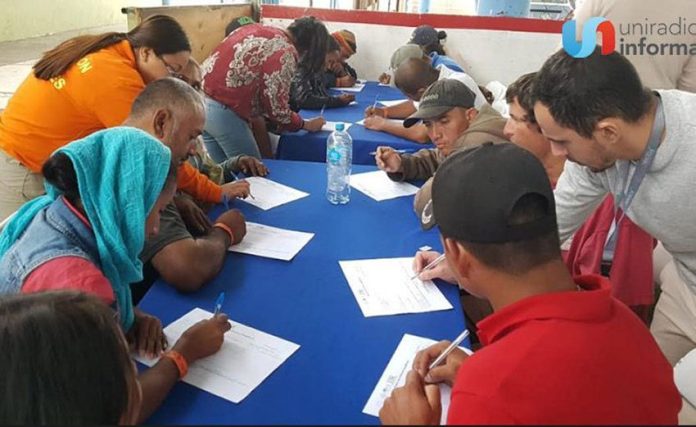The United States is just a stone’s throw away but for thousands of Central American migrants currently in Tijuana, the opportunity to pursue the American dream remains a distant and uncertain goal.
But another option has surfaced, giving them an opportunity to pursue a Mexican dream instead, even if it’s only temporary.
The National Employment Service (SNE), working in conjunction with local companies, has set up a job fair near the Tijuana sports complex where thousands of Central American migrants, who began arriving in the city last week, are being temporarily housed.
Nayla Rangel, chief coordinator of the month-long fair, told the news agency AFP that the fact that the members of the first migrant caravan traveled around 4,400 kilometers to reach Mexico’s northern border from San Pedro Sula, Honduras, showed they are both resilient and determined – qualities that are very attractive to employers.
“They’re very strong people, [they could be] a very valuable workforce for our industry,” she said.
In addition to company representatives, who have set up stalls to interview migrants who are interested in the positions on offer, immigration authorities including the Mexican Refugee Commission are attending the fair to help migrants regularize their immigration status and ensure they can access social security benefits.
“What they’re seeking to do is give them a humanitarian visa so that while their immigration status [in the United States] is being determined they have a work permit,” Rangel said.
Salvador Díaz, president of a local industry association, said that “between 7,000 and 10,000 jobs” are on offer at the migrant job fair including positions in factories and other sectors such as hospitality.
Everyone wins, he pointed out, “migrants get a legal job and business owners [get] tax-deductible labor.”
Wilmar Correa, a 27-year-old Honduran, is one of hundreds of migrants who have attended the fair.
He told AFP that he had studied to become a teacher back home but was unable to get a job due to lack of opportunities.
That, coupled with violence, forced him to leave Honduras. Correa held a sign announcing that he was looking for work as a laborer but said he was prepared to do any type of job.
Another Honduran migrant, 20-year-old César Elvir, said he already passed the first round of interviews for a job as a painter in a factory and was hopeful that he would get a call offering him the position. It comes with a weekly salary of 1,800 pesos (just under US $90).
“It looks good,” said Elvir, who traveled to the border with his wife and two young children.
“My actual goal is not Tijuana but while I wait for other opportunities I have to wait here a while,” he added.
Karla Vallecío, a 34-year-old Honduran woman, was also optimistic that she would find employment as a result of attending the fair.
In Honduras, “I looked after babies, cleaned houses, took in people’s washing, whatever came up,” she said.
“If I get a job the first thing I will do is find a room to stay here in Tijuana. The legal process to request asylum in the United States is slower and more trying than I thought. [Relatives in the United States] have told me to wait for the waters to calm, for all this commotion to pass . . .” Vallecío added.
Díaz, of the local industry association, said the current situation in Tijuana is similar to that of two years ago when thousands of migrants from Haiti arrived.
“The case of Haitians was very positive. There are 2,500 working [legally] now,” he said.
“The most important thing is that they integrated into society well, we haven’t had any problems with them. We want to achieve the same thing with the Central Americans,” Díaz added.
While a wave of anti-migrant sentiment has broken out among some Tijuana residents who claim that there are criminals among the caravan members, the business leader said the majority of migrants who traveled to the border came with their families and good intentions.
“They tell us that they can help us identify these people [the criminals] and turn them into authorities so that they are returned to their country [of origin],” Díaz said.
Source: AFP (sp)
